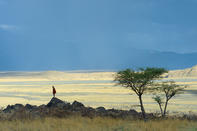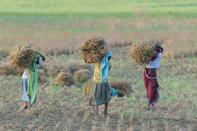Humanity Thrives

About 10 000 BCE (Before Common Era), humanity was embarking on its first tentative steps into property investment and the security of white picket fences. By the time Northern Hemisphere ice began to retreat at the end of the most recent glacial period, we had long mastered our opposable thumbs. Our handiwork with rudimentary tools set us apart from other mammals and our primate cousins. We had mastered the art of walking upright. Our voice box had dropped lower in the throat, positioning the larynx in a place that allowed for a new kind of communication, which served well to manage the hunt and to coordinate groups. In three million years our brain had grown to three times the size of our earlier australopithecine ancestors.
As hunter-gatherers, we were the wandering type, living comfortably off the land. Recent studies of present-day hunter-gatherers suggest that we probably had ample leisure time in our pre-farming days - adult !Kung-San Bushmen in the Kalahari only need a two-day work week to keep their families in good health. We had found our way onto every continental landmass and were happy drifters, adapting to the environment with our smart, well-organised brains. Except for the danger of the occasional hunt, food was easy to come by.
Settling Down into Domesticity

So why on earth did we abandon these bohemian ways to settle down into domesticity? Pursuing an agricultural life, in truth, is more physically demanding. It also opened us up to the vagaries of nature where pests, disease and capricious weather could be dangerous to groups who had lost the ability to pack up and leave when things got difficult. Several explanations have been offered for why we chose to settle. One theory suggests that, at a global population level of four million, competition for resources was increasing. We were running out of new places to exploit and had to find more intensive ways to obtain our required daily calorie intake. Some theorise that the advent of pottery made it possible to store food better, which made it worthwhile to adopt the kind of lifestyle that would generate a food surplus. Waste not, want not!
A more recent idea hypotheses that agriculture was a natural evolution of our relationship with plants and animals. Slowly we modified our environment and encouraged the plants we preferred to eat, giving a little water here or burning some areas there, and frequenting the places that we knew had the food we wanted. We continued to hunt and gather but slowly we began taming the land and domesticating animals which, typically, were 'placid, slow-moving... ate a wide variety of food and existed in highly social groups with submissive herd structures'. When we set up camp we probably began to linger in places. Once the transition was made from drifter to homemaker, there was no going back. It's called the ratchet effect: the ability to produce more food made the population thrive and locked us into intensive farming. It was impossible to return to 'less intensive ways of gaining food'. Ingenuity in the field - irrigation, the plough, animal power - produced food surpluses that fed a growing population and allowed some people with a different bent to pursue activities other than running the family farm. These people became wheelwrights, carpenters and shoemakers. Soon villages sprung up with shopkeepers, politicians, middle managers and war-mongers - welcome to the earliest onset of civilisation. Whatever the reason for choosing domesticity, it tied us into a fragile alliance with the land.
Since then our survival has leaned heavily on that thin margin of food surplus, mostly of cereal crops. We need them for our morning bowl of porridge as well as to feed our livestock, whose roaming days have been tethered by our own sedentary ways. If crops fail for more than one successive season, the results could be disastrous.